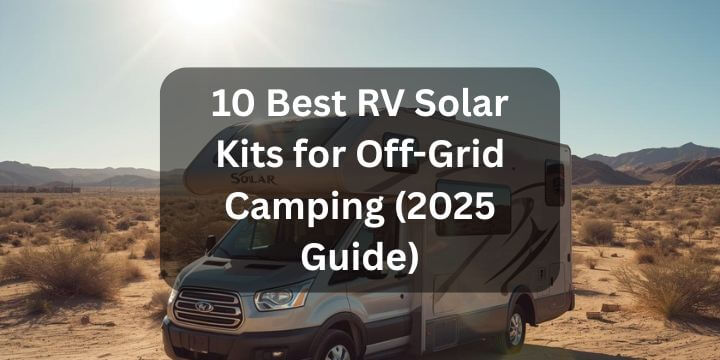5 Best RV Solar Kit On The Market Plus Buyers Guide
A solar panel works by capturing energy from sunlight and passing it through to the charge controller where the energy is fed at the right current to the batteries for storage. With the vast improvement in technology, this process becomes increasingly efficient.
However, many solar panels create relatively small amounts of usable energy. This is so because of their relatively low efficiencies and unreliable sun exposure. Silicon is used in the manufacture of all solar cells.
Its purity and construction determines the cost and the efficiency of the solar cells and consequently the solar panels. A good RV solar panel is clean, quiet, Eco-friendly and generates enough electricity to enable the user to have an experience of the great outdoors with the comfort features of a mobile home. Below are some of the best solar panels for RV on the 2018 market.
Renogy 100 watts 12 volts monocrystalline solar panel.

View on Amazon
This solar panel is commonly referred to as a complete charging monster. It is equipped with the components that are necessary for one to either start or expand the current solar system. Notably, this solar panel has got high energy conversion rates due to its mono-crystalline cells. It has got a small and extremely durable and weatherproof kit which is a perfect choice for RV.
Pros:
Cons:
WindyNation 100 watt solar panel.
View on Amazon
The manufacturer of this kit delivers a reliable and efficient solution for backup power. The panel has got a charge controller that is of high quality and with it, amperage, voltage, and even the temperature can be monitored while charging. The kit is therefore ideal for getting started with solar energy in one’s RV.
Pros:
Cons:
Eco-worthy 20 watts 12 volts solar panel.
View on Amazon
This solar panel can be applied to various direct current appliances making it ideal for everyday use. It is also small in size and has got an aluminum frame that extends its lifespan. This panel is the perfect choice for the irregular surfaces on RVs. The panel is also very efficient with an admirable conversion rate.
Pros:
Cons:
HQST off-grid polycrystalline portable foldable solar panel.
View on Amazon
This solar panel has been designed with easy and convenient installation and this makes it the perfect choice for people new to solar panels. This kit does not come with a battery or battery cables but is the best one to use in charging a twelve volts battery as it takes only three hours to complete the charge of a half-full battery.
Pros:
Cons:
WindyNation complete 400 watts solar panel kit.
View on Amazon
This solar panel has got a charge controller that enables the user to monitor charging on an LCD screen and accordingly make adjustments. With it, the user can expect an average output of one thousand seven hundred watt-hours depending on the weather. This is the best RV solar systems for those people with higher energy demands and does not have battery banks installed in their RVs.
Pros:
Cons:
Things You Need to Know About RV Solar Kits
Recreational Vehicle (or RV for short) proprietors are in a one of a kind position to exploit solar-based power. The twelve volts (12V) control framework utilized as a part of most RVs can be effortlessly altered to oblige solar augmentation.
The question confronting RV proprietors hoping to buy solar panels is normally this. What amount sun oriented power would it be a good idea for me to purchase for my RV and How RV Solar Kit Works? What you buy relies upon numerous variables, a couple of which are covered here.
The principal thing you need to consider while considering solar power is the thing that you need to achieve with it. Do you need your RV to be independent, ready to remain in an area for quite a long time at any given moment without requiring a power charge or generator?
Or on the other hand, would you say you are essentially hoping to get additional battery life out of your RV? Entire independence is an awesome alternative for those with enough surface zone to achieve it.
Video Overview: How to Calculate Your Solar Power Needs | Full-Time RV Tips
To make sure of the number of solar-powered panels you should have to be self-powered, you should have the capacity to give an exact use estimate.
For example on the off chance that you don’t have to heat or cool your RV, you don’t run a microwave, and you drive each other day your solar oriented power needs will be minimal.
Be that as it may, on the off chance that you need to camp in a solitary spot for over seven days without turning on a generator, you have to run a space warmer around evening time, and you leave a light on during the evening; you will require essentially more in the way of solar power.
To ascertain your energy usage, it is almost effortless to utilize a worksheet. There are a few worksheets accessible on the web. The sheet will list the approximate amperage for different RV appliances.
You increase the number by the measure of time that the appliance would spend running in a typical day, which will yield an answer as amp/hours. A common 80 watt RV sunlight based pack will give a panel that can deliver 25-35 amp/hours of energy.
> You may also like:Gas vs Diesel For Towing a Fifth Wheel?<<
Video Overview: Basic Solar Parts Needed for a DIY Camper Van or RV Solar Install
To figure your genuine solar requirements, give yourself a 10-15% cradle for effectiveness misfortune in the capacity framework, and buy enough panels to provide the necessary power.
In case you’re a seasoned RV owner, you comprehend that space is at a premium in an RV. It is the same with regards to solar power; you should deliberately think about your installation alternatives.
Angle panels will give preferable power creation over panels that lie level on your rooftop. An angled panel on the best corners of your vehicle will raise your vehicle’s profile; this is vital to think about while exploring an RV.
Notwithstanding whether you choose to provide a boost in battery existence with a couple of solar-powered panels or turn into an independent power creating condition; an RV solar oriented unit is speculation that will pay itself off after some time.
Leaving the generator off while stayed outdoors will be more quiet, and better for the earth to boot. On the off chance that you design well, solar oriented panels will compensate you with a migraine-free power for quite a long time.
Conclusion
Using solar energy while traveling has both advantages and disadvantages, some of the advantages are; that they offer freedom, there is no risk of burns or chemicals, low maintenance, and a longer lifespan. However, the most notable disadvantage with them is that there is limited space for arrays and power banks.
Related Post: 45 RV Accessory Must-Haves for Your Travel Trailer
Related Questions:
How many solar panels do I need to run an RV?
The question isn’t what size solar panels do I need, but how many watts of solar do I need for my RV? It depends on where you live and the amount of power your camper is using. You can determine how many solar panels you will require by looking at the power consumption chart provided by your electric system manufacturer.
How many watts of solar do I need for my RV?
An average medium sized camper will use anywhere from 300 watts to 500 watts a day, but this is just an estimate. If you have a small RV then 20 watts will work just fine and if you have a larger one that uses more power then 40 or 60 watts might be required. Keep in mind that your solar panels should be able to provide 80-95% of the power your camper is using in order for them to work efficiently.
Video Overview: How many solar panels do I need on my RV?
https://www.youtube.com/watch?v=UZ-OclSicHM
What will a 100 watt solar panel run in a RV?
A larger camper or one that uses more power with multiple appliances and electronic devices may require two or three solar panels to run efficiently. Solar panels can be connected in parallel or series to increase the voltage and amperage which will then require less panels to power your RV lights, TV, air conditioner and other devices.
Can you run an RV air conditioner with solar power?
Yes, you can always use a solar panel to run your air conditioner with a solar charge controller and deep cycle batteries. You can use more than one solar panel if you need to, most setups will require two panels to power the air conditioner itself.
Are solar panels for an RV worth it?
Solar panels are worth it if you plan on living off the grid or want to be environmentally friendly. Solar power is a renewable resource and harnesses the power of the sun. It provides free energy that can save you thousands of dollars if it completely powers your RV, but keep in mind that they may not fully meet all your power needs.
How much does it cost to install solar panels on an RV?
The cost of installing one or two solar panels will range from $200 to over a thousand dollars. It varies by the watts of power your camper needs and how many hours of sunlight you get per day, which can determine how big your solar panel array should be. The more watts of power required will determine how many solar panels you need and if they are going to be mounted on your roof or to your ground.
> You may also like:Worst 5th Wheel Brands to Avoid <<
New to RV Living? Start the Right Way — From Day One.
Avoid costly beginner mistakes and start RV living with confidence using a simple, proven system.
Download the RV Beginner Starter PackInstant download · Beginner-friendly · Secure checkout
